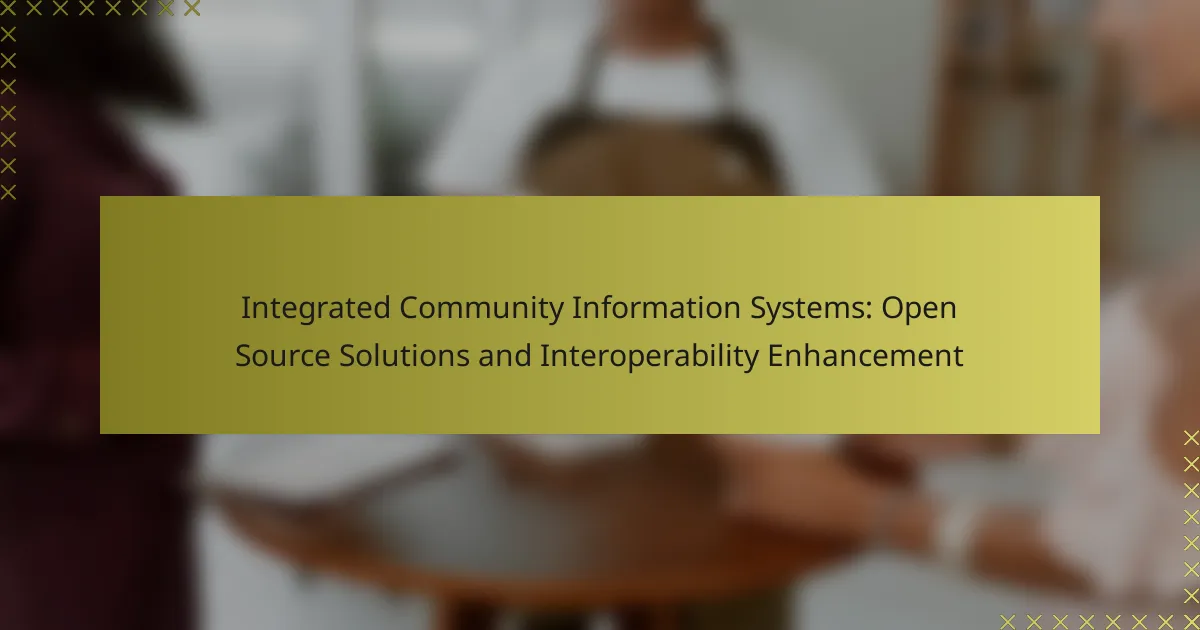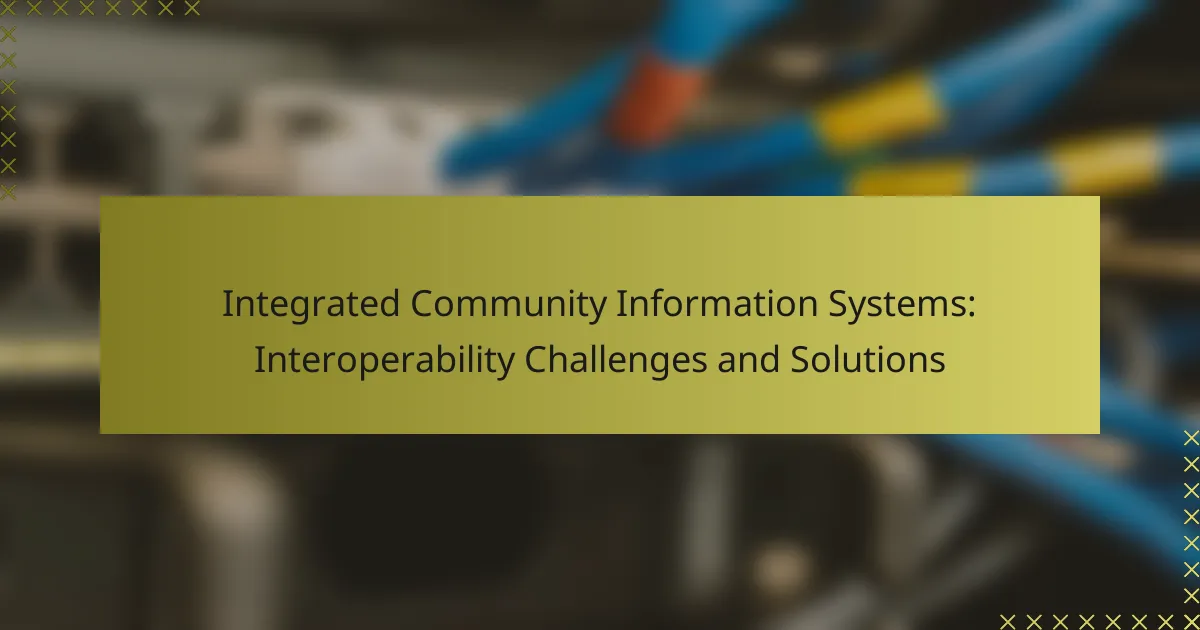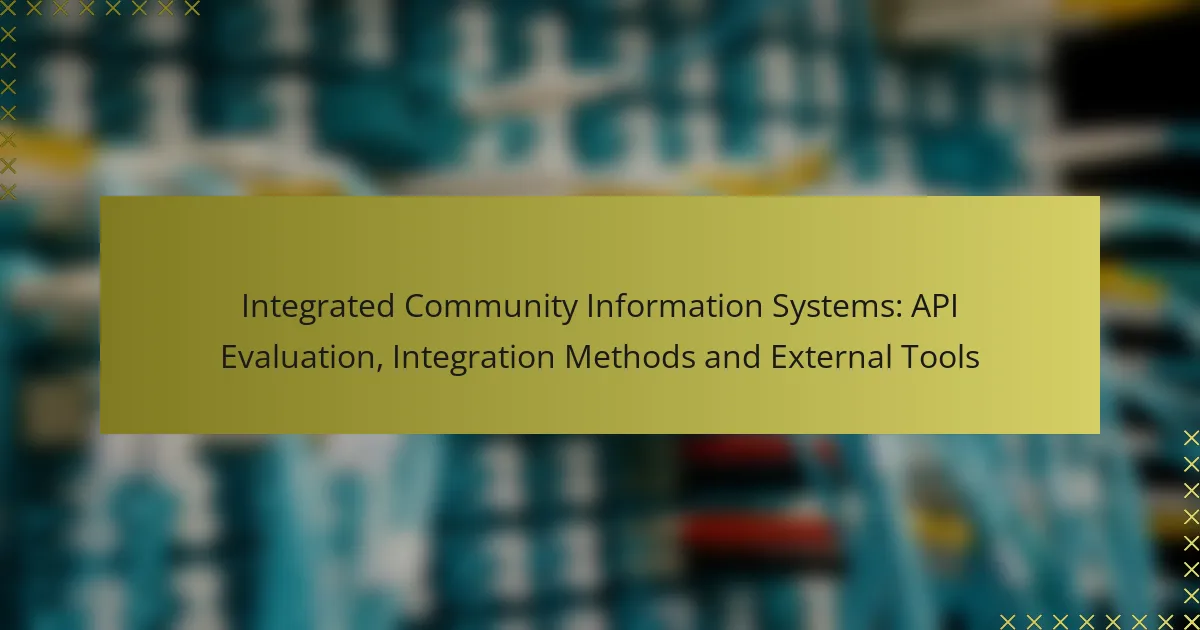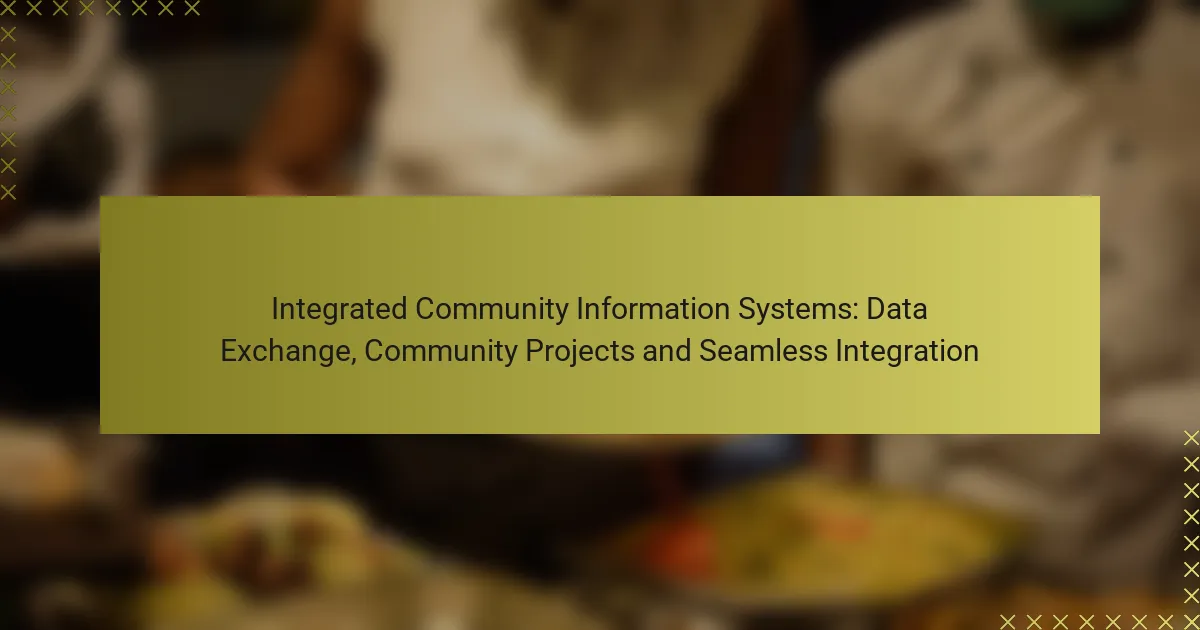Integrated Community Information Systems (ICIS) leverage open source solutions to enhance data sharing and interoperability among community services. By utilizing flexible frameworks and common standards, these systems facilitate effective communication and collaboration, ultimately improving access to information for both citizens and organizations. The adoption of ICIS leads to better coordination, streamlined operations, and more efficient resource allocation within communities.
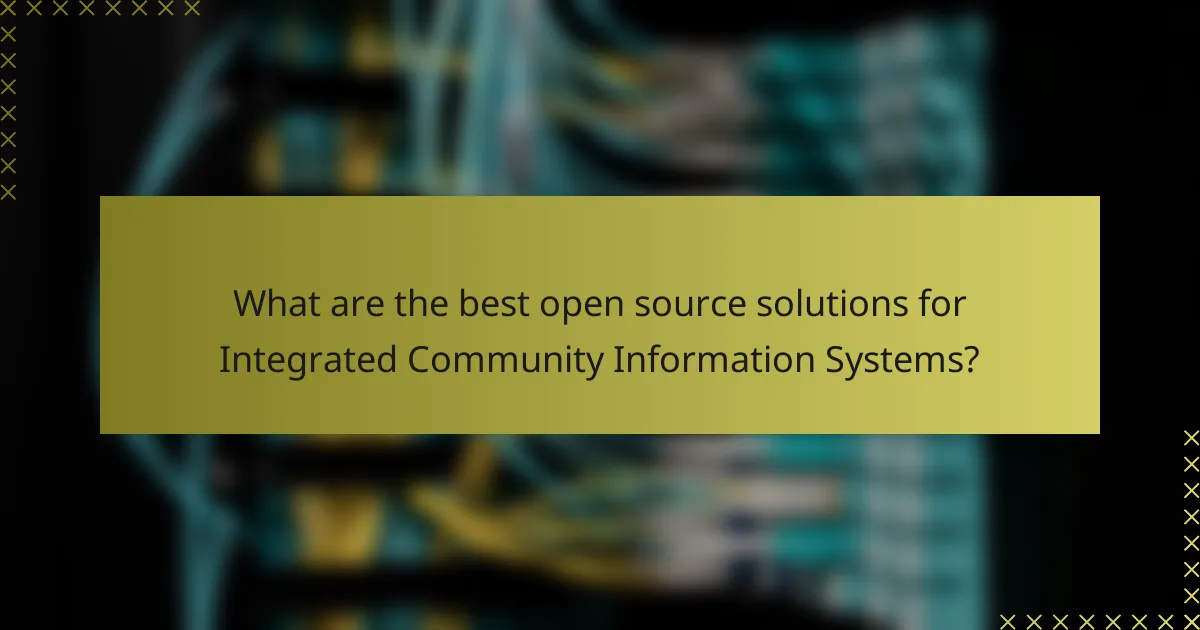
What are the best open source solutions for Integrated Community Information Systems?
The best open source solutions for Integrated Community Information Systems (ICIS) include platforms that enhance data sharing and interoperability among community services. These tools facilitate collaboration, streamline processes, and improve access to information for citizens and organizations alike.
Open311
Open311 is a standard for sharing public service requests and data between citizens and local governments. It enables users to report issues like potholes or broken streetlights through various channels, including mobile apps and websites.
This system allows municipalities to manage requests efficiently, track progress, and communicate updates to citizens. Implementing Open311 can improve transparency and responsiveness in community services.
CKAN
CKAN is a powerful data management system designed for publishing and sharing open data. It allows organizations to create data catalogs that are easily searchable and accessible to the public.
By using CKAN, communities can promote transparency and encourage civic engagement through data-driven decision-making. It supports various data formats and includes features for data visualization, making it a versatile tool for community information systems.
Drupal
Drupal is a flexible content management system that can be customized for Integrated Community Information Systems. It offers modules that support community engagement, event management, and information sharing.
With its robust user permissions and multilingual capabilities, Drupal is suitable for diverse communities looking to create interactive websites that serve various stakeholders. Consider leveraging its extensive library of modules to enhance functionality.
OpenStreetMap
OpenStreetMap (OSM) is a collaborative mapping project that provides free geographic data and mapping to anyone. It allows communities to create detailed maps that can be used for urban planning, disaster response, and resource management.
Utilizing OpenStreetMap can enhance community information systems by providing accurate and up-to-date geographical information. Local governments can integrate OSM data into their systems to improve service delivery and planning efforts.
QGIS
QGIS is an open-source geographic information system that enables users to analyze and visualize spatial data. It is widely used for mapping and spatial analysis in community planning and resource management.
Communities can leverage QGIS to create detailed maps and perform analyses that inform decision-making processes. It supports various data formats and can be integrated with other open-source tools to enhance community information systems.
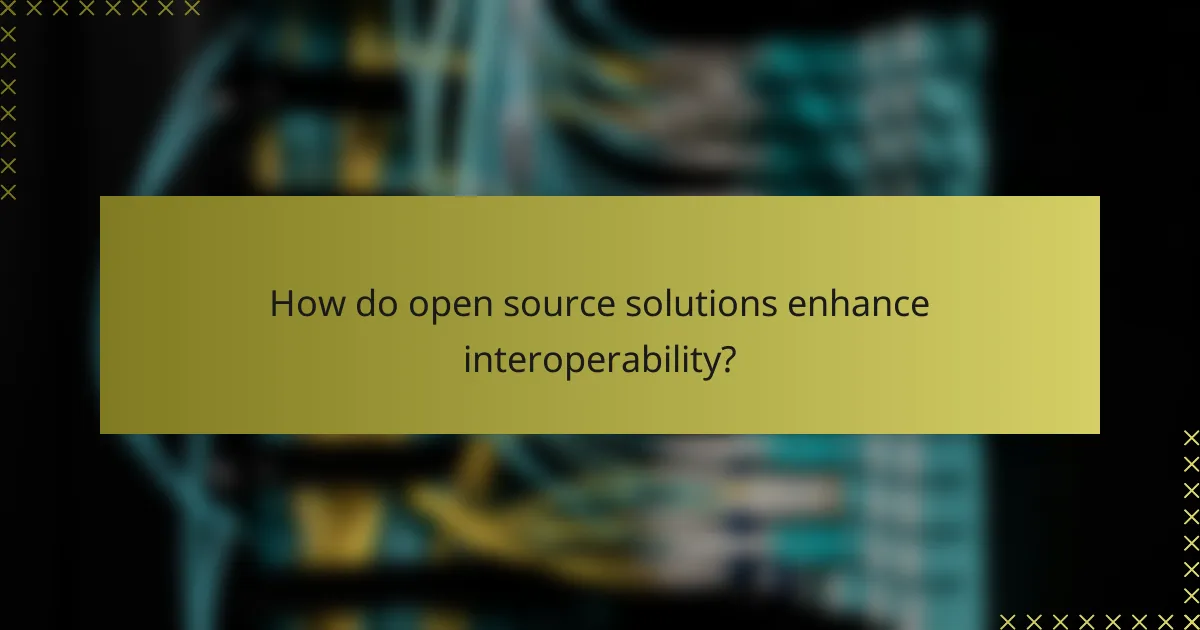
How do open source solutions enhance interoperability?
Open source solutions enhance interoperability by providing flexible frameworks that allow different systems to communicate effectively. They promote the use of common standards and protocols, which facilitate seamless data exchange across various platforms.
Standardized data formats
Standardized data formats are crucial for ensuring that information can be shared and understood across different systems. Formats such as JSON, XML, and CSV are widely used in open source solutions, allowing diverse applications to read and write data consistently.
When implementing standardized data formats, consider the specific needs of your community. For example, using widely accepted formats can reduce integration time and minimize errors during data transfers.
API integrations
API integrations enable different software applications to interact and share data in real-time. Open source solutions often come with well-documented APIs that allow developers to connect various systems easily, enhancing interoperability.
When choosing APIs, prioritize those that adhere to common standards like REST or GraphQL. This ensures that your integrations are not only functional but also scalable and maintainable over time.
Interoperable platforms
Interoperable platforms are designed to work together seamlessly, allowing users to access and share data across different systems without significant barriers. Open source platforms often prioritize interoperability, making it easier for organizations to collaborate and share resources.
To maximize the benefits of interoperable platforms, assess the compatibility of existing systems within your community. Look for platforms that support open standards and have a strong community backing to ensure ongoing support and development.
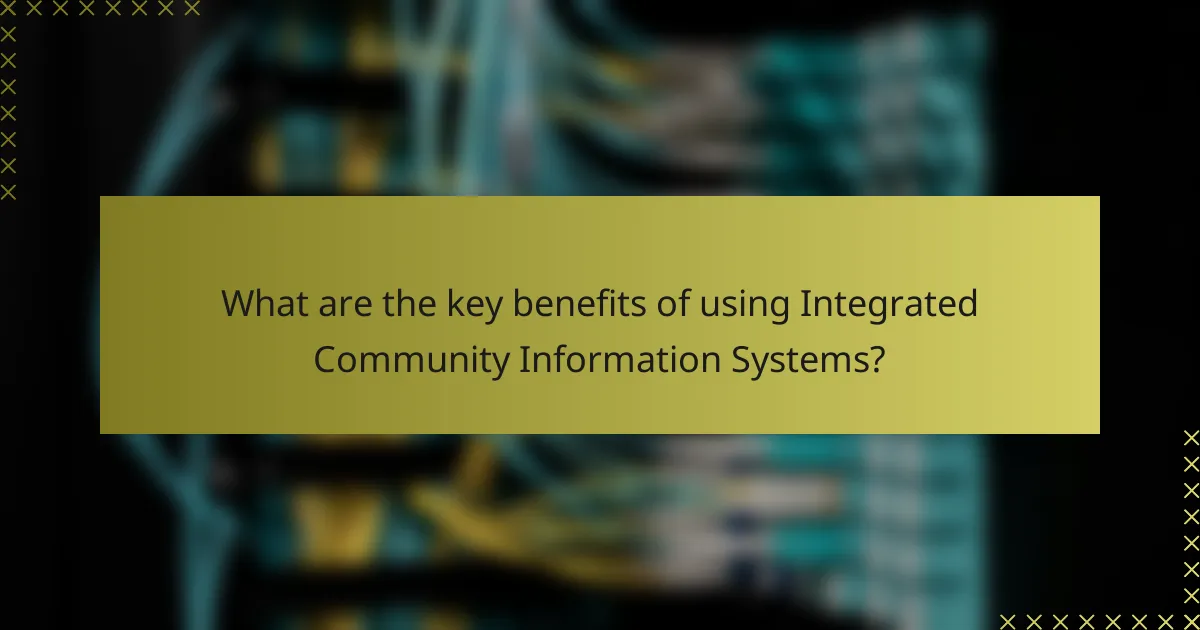
What are the key benefits of using Integrated Community Information Systems?
Integrated Community Information Systems (ICIS) offer several advantages, including improved coordination among community services, enhanced data sharing, and increased efficiency in resource allocation. These systems enable communities to streamline operations and foster collaboration among various stakeholders.
Cost efficiency
One of the primary benefits of ICIS is cost efficiency. By integrating various community services into a single platform, organizations can reduce redundancy and lower operational costs. This consolidation often leads to savings in both time and financial resources.
For example, instead of maintaining separate databases for health, education, and social services, a unified system can manage all data in one place. This approach can result in significant reductions in software licensing fees and maintenance costs.
Community engagement
ICIS fosters greater community engagement by providing accessible platforms for residents to interact with local services. These systems often include user-friendly interfaces that allow community members to access information, provide feedback, and participate in decision-making processes.
For instance, a community portal can enable residents to report issues, such as potholes or broken streetlights, directly to local authorities. This direct line of communication encourages civic participation and helps build trust between residents and service providers.
Data transparency
Data transparency is a crucial benefit of Integrated Community Information Systems. By making data accessible to both service providers and community members, these systems promote accountability and informed decision-making. Transparency helps ensure that resources are allocated fairly and effectively.
Communities can publish performance metrics, service usage statistics, and funding allocations through ICIS. This openness allows residents to understand how their tax dollars are being spent and encourages public scrutiny, which can lead to improved service delivery.
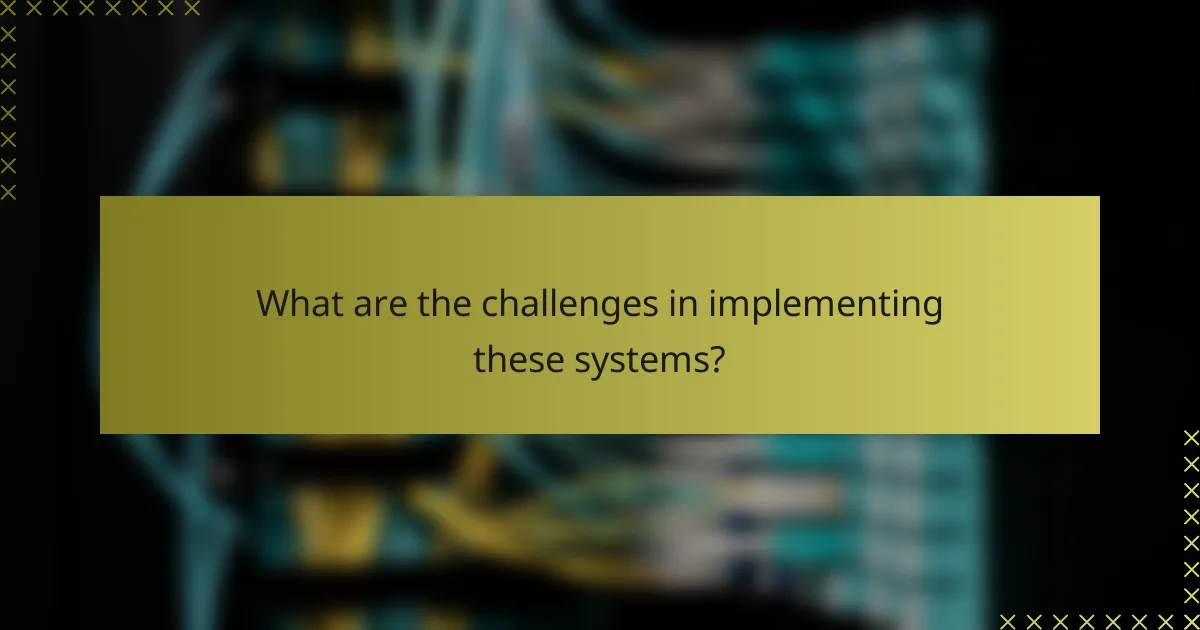
What are the challenges in implementing these systems?
Implementing integrated community information systems presents several challenges, including the need for specialized technical expertise, concerns about data privacy, and complexities in integrating various systems. Addressing these issues is crucial for successful deployment and operation.
Technical expertise requirements
Successful implementation of integrated community information systems requires a high level of technical expertise. Organizations often need skilled personnel who are proficient in software development, system architecture, and data management to navigate the complexities of open-source solutions.
Additionally, training existing staff can be resource-intensive, as they must become familiar with new technologies and methodologies. Organizations should consider investing in ongoing education and partnerships with tech experts to bridge knowledge gaps.
Data privacy concerns
Data privacy is a significant challenge in the deployment of integrated community information systems. These systems often handle sensitive personal information, making compliance with regulations like GDPR in Europe or HIPAA in the U.S. essential to avoid legal repercussions.
Organizations must implement robust security measures, including encryption and access controls, to protect user data. Regular audits and risk assessments can help identify vulnerabilities and ensure that privacy standards are maintained throughout the system’s lifecycle.
Integration complexities
Integrating various systems into a cohesive framework can be complex and time-consuming. Different platforms may use incompatible data formats or protocols, leading to challenges in data exchange and interoperability.
To mitigate these issues, organizations should adopt standardized APIs and data formats wherever possible. Developing a clear integration strategy, including phased rollouts and testing, can help streamline the process and reduce the risk of system failures.

How to choose the right open source solution?
Choosing the right open source solution for integrated community information systems involves assessing specific community needs, scalability, and available user support. A well-informed decision will enhance interoperability and ensure the solution aligns with community goals.
Assess community needs
Understanding the unique requirements of your community is crucial when selecting an open source solution. Engage with stakeholders to identify key functionalities, such as data sharing, reporting, or user access levels that are essential for your community’s operations.
Consider conducting surveys or focus groups to gather input on desired features. This feedback will help prioritize which capabilities are non-negotiable and which are optional, ensuring the chosen system effectively meets community demands.
Evaluate scalability
Scalability is a vital factor in choosing an open source solution, as it determines how well the system can grow with your community. Assess whether the software can handle increased data loads, user numbers, and additional functionalities over time.
Look for solutions that offer modular components or plugins, allowing you to expand the system as needed. This flexibility can save costs and reduce the need for a complete overhaul in the future.
Consider user support
User support can significantly impact the successful implementation and ongoing use of an open source solution. Investigate the availability of community forums, documentation, and professional support services to ensure users can access help when needed.
Evaluate the responsiveness of the community or vendor to issues and updates. A strong support network can enhance user experience and facilitate smoother transitions during system upgrades or troubleshooting.
